April 23, 2018
 The Women’s Prize for Fiction has announced its 2018 shortlist. This annual award, now in its 23rd year, celebrates excellence, originality and accessibility in writing by women throughout the world. Three books published by Penguin Random House in the U.S. and Canada are on this year’s Women’s Prize shortlist:
The Women’s Prize for Fiction has announced its 2018 shortlist. This annual award, now in its 23rd year, celebrates excellence, originality and accessibility in writing by women throughout the world. Three books published by Penguin Random House in the U.S. and Canada are on this year’s Women’s Prize shortlist:
expand
THE IDIOT by Elif Batuman (
Penguin Press)
SIGHT by Jessie Greengrass (
Hogarth, to be published 8/21/18)
HOME FIRE by Kamila Shamsie (
Riverhead)
View the complete Women’s Prize for Fiction 2018 shortlist
here.
The Women’s Prize for Fiction winning title will be revealed at an awards ceremony in London on June 6 – the author taking home £30,000 and a bronze figurine, “the Bessie.”
April 13, 2018
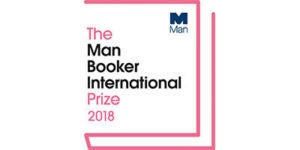 The Man Booker International Prize, which annually celebrates the finest works of translated fiction from around the world, has announced its 2018 shortlist of six titles, with three of the books published by Penguin Random House imprints:
The Man Booker International Prize, which annually celebrates the finest works of translated fiction from around the world, has announced its 2018 shortlist of six titles, with three of the books published by Penguin Random House imprints:
expand
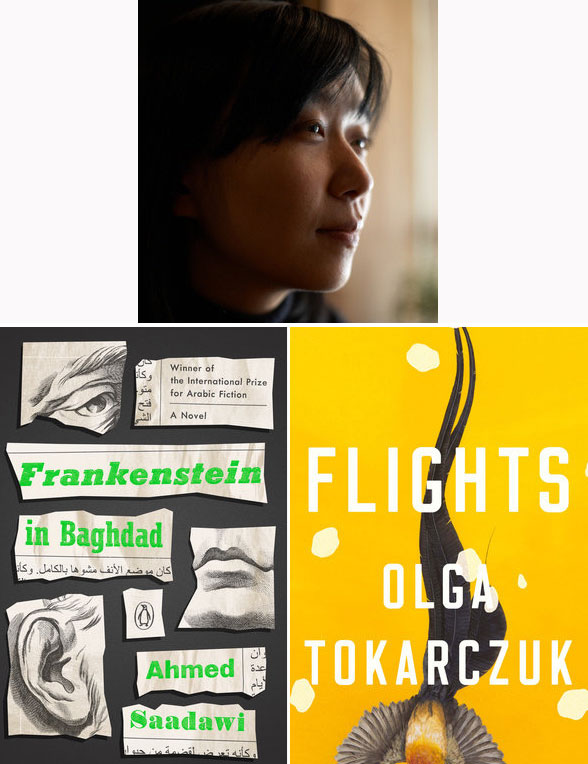 THE WHITE BOOK by Han Kang
THE WHITE BOOK by Han Kang (South Korea), translated by Deborah Smith (
Hogarth to publish in the U.S. in Spring 2019)
FRANKENSTEIN IN BAGHDAD by Ahmed Saadawi (Iraq), translated by Jonathan Wright (
Penguin Books published in the U.S. 1/23/18)
FLIGHTS by Olga Tokarczuk (Poland), translated by Jennifer Croft (
Riverhead Books to publish in the U.S. 8/14/18)
View the complete Man Booker International Prize 2018 shortlist
here.
The panel of judges included two Penguin Random House authors: Hari Kunzru, whose most recent book is
WHITE TEARS (
Vintage), and Helen Oyeyemi, whose most recent book is
WHAT IS NOT YOUR IS NOT YOURS (
Riverhead).
The winner of the 2018 prize will be announced on May 22 at an awards dinner at the Victoria & Albert Museum in London, with the £50,000 prize being divided equally between the author and the translator of the winning book. In addition, each shortlisted author and translator will share £1,000 each.
April 11, 2018
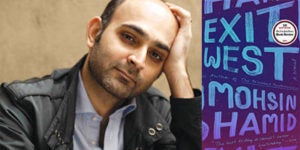 Mohsin Hamid’s EXIT WEST (Riverhead Books) has won the inaugural Aspen Words Literary Prize, a new $35,000 award given to “an influential work of fiction that illuminates a vital contemporary issue and demonstrates the transformative power of literature on thought and culture.” The four finalists included fellow Riverhead author Lesley Nneka Arimah for WHAT IT MEANS WHEN A MAN FALLS FROM THE SKY and Viking author Zinzi Clemmons for WHAT WE LOSE.
Mohsin Hamid’s EXIT WEST (Riverhead Books) has won the inaugural Aspen Words Literary Prize, a new $35,000 award given to “an influential work of fiction that illuminates a vital contemporary issue and demonstrates the transformative power of literature on thought and culture.” The four finalists included fellow Riverhead author Lesley Nneka Arimah for WHAT IT MEANS WHEN A MAN FALLS FROM THE SKY and Viking author Zinzi Clemmons for WHAT WE LOSE.
expand
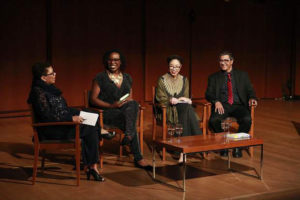
Riverhead Vice President, Editorial Director
Rebecca Saletan accepted the award on Hamid’s behalf at the awards ceremony on Tuesday night at the Morgan Library in Manhattan. Afterwards, Saletan
talked with NPR’s Linda Holmes about EXIT WEST. You can find out more about the ceremony and watch Mohsin Hamid’s recorded speech
here. Among Hamid’s remarks: "I'm really grateful to be honored by this prize in particular, which is a prize that looks to books to have an impact on the world."
In a conversation with NPR host Michel Martin during the evening, Arimah gave advice to new writers: “Be radically honest with yourself and with everyone else.”
March 1, 2018
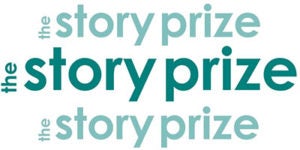 Elizabeth Strout has won The Story Prize for ANYTHING IS POSSIBLE (Random House), receiving a $20,000 award and an engraved silver bowl at the 14th annual Story Prize event, which took place on Wednesday, February 28, at The New School in Manhattan. The Story Prize judges offered high praise for Strout and her latest collection of short stories: “The intelligent prose is seemingly humble but elegant in its subtlety and enchanting in its overall effect. The blade of her wit is so sharp, you barely feel it until after the slice. Strout is a specialist in the reticence of people, and her characters are compelling because of the complexity of their internal lives, and the clarity with which that complexity is depicted. It is a sublime pleasure to read her work.”
Elizabeth Strout has won The Story Prize for ANYTHING IS POSSIBLE (Random House), receiving a $20,000 award and an engraved silver bowl at the 14th annual Story Prize event, which took place on Wednesday, February 28, at The New School in Manhattan. The Story Prize judges offered high praise for Strout and her latest collection of short stories: “The intelligent prose is seemingly humble but elegant in its subtlety and enchanting in its overall effect. The blade of her wit is so sharp, you barely feel it until after the slice. Strout is a specialist in the reticence of people, and her characters are compelling because of the complexity of their internal lives, and the clarity with which that complexity is depicted. It is a sublime pleasure to read her work.”
expand
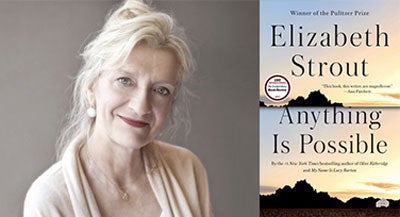
The Story Prize runners-up –
Daniel Alarcón for
THE KING IS ALWAYS ABOVE THE PEOPLE (
Riverhead Books) and
Ottessa Moshfegh for
HOMESICK FOR ANOTHER WORLD (
Penguin Press) – were also honored and each received $5,000.
Three independent Story Prize judges – Knopf/Vintage author and poet Susan Minot, critic and author Walton Muyumba, and Library Journal Associate Editor Stephanie Sendaula – selected the three finalists from among 120 submissions representing 93 different publishers or imprints, and then determined the winner.
Warm congratulations to Ms. Strout, her editor and publisher.
February 6, 2018
 THE LINE BECOMES A RIVER: Dispatches from the Border, published by Riverhead Books, presents a first-person narrative by author and former Border Patrol agent Francisco Cantú. The border between the United States and Mexico is in his blood: his mother, a park ranger and daughter of a Mexican immigrant, raised him in the scrublands of the Southwest. Haunted by the landscape of his youth, Cantú became an agent for the United States Border Patrol in 2008, working in the deserts of Arizona, New Mexico, and Texas. He and his partners were posted to remote regions crisscrossed by drug routes and smuggling corridors, where they learned to track other humans under blistering sun and through frigid nights. They hauled in the dead and delivered to detention those they found alive. Plagued by nightmares, Cantú abandoned the Border Patrol for civilian life in 2012. But when an immigrant friend traveled to Mexico to visit his dying mother and did not return, Cantú discovered that the border had migrated with him.
THE LINE BECOMES A RIVER: Dispatches from the Border, published by Riverhead Books, presents a first-person narrative by author and former Border Patrol agent Francisco Cantú. The border between the United States and Mexico is in his blood: his mother, a park ranger and daughter of a Mexican immigrant, raised him in the scrublands of the Southwest. Haunted by the landscape of his youth, Cantú became an agent for the United States Border Patrol in 2008, working in the deserts of Arizona, New Mexico, and Texas. He and his partners were posted to remote regions crisscrossed by drug routes and smuggling corridors, where they learned to track other humans under blistering sun and through frigid nights. They hauled in the dead and delivered to detention those they found alive. Plagued by nightmares, Cantú abandoned the Border Patrol for civilian life in 2012. But when an immigrant friend traveled to Mexico to visit his dying mother and did not return, Cantú discovered that the border had migrated with him.
In our Behind the Pages interview, Francisco Cantú and Rebecca Saletan, Vice President, Editorial Director for Riverhead, share personal insights into the creation of THE LINE BECOMES A RIVER, ongoing border-related issues, and the harsh realities that this book illuminates.
expand
[caption id="attachment_9400" align="alignright" width="200"]

Francisco Cantu, credit Beowulf Sheehan[/caption]
What inspired you to become a writer and chronicle your life experiences on the page?
FC: What initially led me to become a writer was the need to make sense of the years I spent working as a Border Patrol agent. I signed up for the job after college, looking for answers to all the questions I encountered in my studies of immigration and border policy. I was looking for the something that would bring me close to the border, something that would let me experience it to its fullest extent. The Border Patrol seemed like the only way to do that, to witness the harsh day-to-day realities of the border, to be out in the desert day in and day out. The job, of course, was a violent one, in ways that were both obvious and more subtle. Instead of finding the answers I was looking for, I ended up coming away with more questions, and that’s what led me to writing—it became a compulsion, something I had to do in order to come to terms with all the complicated ways my work had caused me to normalize and participate in structural violence.
How did you discover this author and what were your first impressions of the manuscript for this book?
RS: I received an early draft of the book on submission in late September 2016, weeks before the election. Although we did not know then how large the border would loom in the national conversation, I could not stop thinking about it. Sometimes projects move so quickly editors don’t have time to see how the reading experience sits with us, but because the author was coming up from Tucson to meet with interested publishers, I had a little time to take my own temperature. What stayed with me was the understated force of the storytelling. I felt haunted by it, the way the US-Mexican border—the border whose line becomes a river—haunts America. The way the past and the present and the fate of those on both sides of it are inextricably entwined, no matter how high a wall we build.
[caption id="attachment_9401" align="alignleft" width="300"]

Rebecca Saletan, credit Louie Saletan[/caption]
What was involved in working with Francisco during the editorial process?
RS: I like to say that editing is 99 percent deletion, taking out what doesn’t need to be there, creating white space for the reader’s emotional response. But in this case what was needed was to imagine what wasn’t yet there that would help deepen and sharpen the arc of the narrative without making it heavy-handed. I thought readers needed to feel a little more the effect of Cantú’s experience on him so that we could feel its effect on us. That meant judiciously adding material: signal moments from his childhood, his family background, and the deeper history of the border itself. These elements, which he deftly wove in, amplify the narrative and allow the reader to accompany him toward a kind of reckoning that we don’t see coming until it is upon us.
What takeaways do you hope readers will glean from your book?
FC: If nothing else, I want readers to come away feeling that the border is a place that is immensely complex and nuanced, to the extent that they reject simplified rhetoric about immigration and border policy. I think it’s important at this particular moment to take stock of all the things that are missing from our conversation about the border, such as the actual human costs of our current policy. People seem to forget that migrants are dying in the desert, and it’s not a small number, we’re talking about hundreds of people each year, and those are just the ones that get reported. Our current policy of “enforcement through deterrence” has weaponized the landscape, pushing people to cross in the most rugged and inhospitable terrain there is. There’s a humanitarian crisis occurring at our border but we don’t seem to recognize it as such—we don’t acknowledge the people who are dying there, we don’t name their bodies, we don’t mourn their deaths. That’s unacceptable; it has to change. We have to understand each number in each statistic as representing an individual life.
January 23, 2018
 The National Book Critics Circle has announced the finalists for its 2017 awards. Penguin Random House imprints publish six finalists for NBCC Awards in the following categories:
The National Book Critics Circle has announced the finalists for its 2017 awards. Penguin Random House imprints publish six finalists for NBCC Awards in the following categories: 
expand
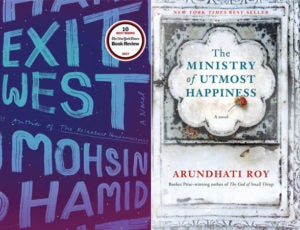 FICTION
Mohsin Hamid
FICTION
Mohsin Hamid,
EXIT WEST (
Riverhead)
Arundhati Roy,
THE MINISTRY OF UTMOST HAPPINESS (
Knopf)
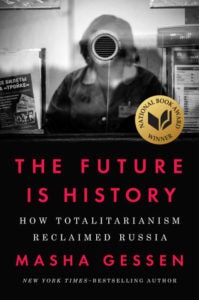 NONFICTION
Masha Gessen
NONFICTION
Masha Gessen,
THE FUTURE IS HISTORY: How Totalitarianism Reclaimed Russia (
Riverhead)
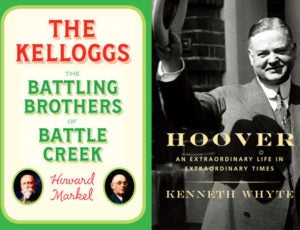 BIOGRAPHY
Howard Markel
BIOGRAPHY
Howard Markel,
THE KELLOGGS: The Battling Brothers of Battle Creek (
Pantheon)
Kenneth Whyte,
HOOVER: An Extraordinary Life in Extraordinary Times (
Knopf)
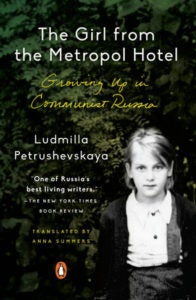 AUTOBIOGRAPHY
Ludmilla Petrushevskaya
AUTOBIOGRAPHY
Ludmilla Petrushevskaya,
THE GIRL FROM THE METROPOL HOTEL: Growin Up in Communist Russia (
Penguin)
View the complete list of NBCC finalists
here.
Winners of the NBCC awards will be announced on Thursday, March 15 in NYC at the New School’s Tishman Auditorium. A finalists’ reading will be held on March 14 at 6:30 p.m. in the same location. Both events are free and open to the public.
The National Book Critics Circle was founded in 1974 at New York’s Algonquin Hotel by a group of the most influential critics of the day, and awarded its first set of honors in 1975. The NBCC now comprises more than 1,000 working critics and book-review editors throughout the country. The NBCC annually bestows its awards in six categories, honoring the best books published in the past year in the United States.
December 8, 2017
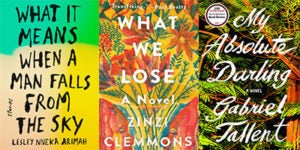 The National Book Critics Circle has announced the finalists for the 2017 John Leonard Prize, which honors the first book in any genre, with Penguin Random House imprints publishing three of the six nominated titles:
The National Book Critics Circle has announced the finalists for the 2017 John Leonard Prize, which honors the first book in any genre, with Penguin Random House imprints publishing three of the six nominated titles:
expand
WHAT IT MEANS WHEN A MAN FALLS FROM THE SKY by Lesley Nneka Arimah (Riverhead)
WHAT WE LOSE by Zinzi Clemmons (Viking)
MY ABSOLUTE DARLING by Gabriel Tallent (Riverhead)
This year’s Leonard Prize winner will be selected by an NBCC judging panel and announced in January with the finalists in the other 2017 NBCC Award categories, and presented at the NBCC Awards Ceremony at The New School in Manhattan on March 15, 2018.
View the complete list of 2017 John Leonard Prize nominees
here.
August 14, 2017
 This week’s Igloo Book Buzz, HOME FIRE by Kamila Shamsie, was shortlisted for the 2017 Man Booker Prize and published by Riverhead Books on August 15. Suspenseful and heartbreaking, this is the story of an immigrant family driven to pit love against loyalty, with devastating consequences.
This week’s Igloo Book Buzz, HOME FIRE by Kamila Shamsie, was shortlisted for the 2017 Man Booker Prize and published by Riverhead Books on August 15. Suspenseful and heartbreaking, this is the story of an immigrant family driven to pit love against loyalty, with devastating consequences.
expand
Ms. Shamsie revealed, “The idea of adapting Sophocles’ Antigone in a contemporary context was first suggested to me by a man called Jatinder Verma, who runs a theatre company in London. Hedidn’t define a particular contemporary context but this was atime when the papers were full of stories of young British Muslim men going to Syria to join the Islamic State, and the government was wanting to respond by stripping them of their citizenship. I very quickly saw how those stories in the headlines could be laid on to an ancient Greek story about two sisters who are forbidden from burying their brother, because of his crimes against the state – one accepts the state’s edict, the other doesn’t. The more times I read the play the more it struck me as being so filled with potential because it’s about large themes of justice and the state vs. the individual while also being the story of characters whose lives are entwined by blood and by love.”
[caption id="attachment_7435" align="alignright" width="250"]

Kamila Shamsie
Credit: Zain Mustafa[/caption]
The book’s editor, Riverhead Vice President and Editorial Director
Rebecca Saletan, said, “Though I’d long admired Kamila’s work, this was my first time publishing her. To my delight, that involved some of my favorite kind of editorial work—helping her to figure out, in conjunction with her longtime editorial team at Bloomsbury, how to fine-tune some of the emotional dynamics as she finished transposing the story from classical Greek drama to thrilling contemporary novel. HOME FIRE
would have been a pleasure to publish at any time, but it is so—what’s the right word, empowering?— to have it to bring before the world at this moment when aggressive xenophobia is being fueled from on high. A teenager goes astray, a family who have lived in a country for decades are suddenly ‘other’ – it humanizes powerfully and inescapably the dilemmas of our moment.”
Reviewer praise for HOME FIRE has been unequivocally rapturous:
“Ingenious and love-struck … HOME FIRE takes flight. … Shamsie drives this gleaming machine home in a manner that, if I weren’t handling airplane metaphors, I would call smashing. … Builds to one of the most memorable final scenes I’ve read in a novel this century.” —
The New York Times
“This is a haunting novel, full of dazzling moments and not a few surprising turns … HOME FIRE blazes with the kind of annihilating devastation that transcends grief.” —
The Washington Post
“All of Shamsie’s novels are deeply moving and morally complex, leading to the kind of rich reading experience most of us hope for in every novel we pick up. Her newest has all of that and more.” —
San Francisco Chronicle
“Shamsie’s timely fiction probes the roots of radicalism and the pull of the family.” —
O, the Oprah Magazine
June 23, 2016
 Revisiting our early June post about Riverhead’s Fundraiser for Libraries Without Borders, this month-long campaign has now generated nearly $5,000 in donations, with one week left for people to contribute. Anyone who makes a donation of $250 or more receives a 3D head of the author of their choosing. Riverhead Design Labs partnered with Leblox to create 3D heads of some of the imprint’s most iconic authors, such as Junot Diaz, Marlon James, Ann Lamott, and
Revisiting our early June post about Riverhead’s Fundraiser for Libraries Without Borders, this month-long campaign has now generated nearly $5,000 in donations, with one week left for people to contribute. Anyone who makes a donation of $250 or more receives a 3D head of the author of their choosing. Riverhead Design Labs partnered with Leblox to create 3D heads of some of the imprint’s most iconic authors, such as Junot Diaz, Marlon James, Ann Lamott, and
expand
Lauren Groff, among others. So far, Junot Diaz is the more popular 3D head, with Anne Lamott a close second.
Libraries Without Borders is doing incredible work bringing books, tutors, computers and more to the refugee camps in the Middle East and Europe to help Syrian refugees. Riverhead Books is committed to not only amplifying and celebrating unheard voices, but also doing what they can in the fight for global literacy and access to technology. Go to this website for more details and to contribute by June 30:
http://app.snapapp.com/Riverhead3D
 The Women’s Prize for Fiction has announced its 2018 shortlist. This annual award, now in its 23rd year, celebrates excellence, originality and accessibility in writing by women throughout the world. Three books published by Penguin Random House in the U.S. and Canada are on this year’s Women’s Prize shortlist:
The Women’s Prize for Fiction has announced its 2018 shortlist. This annual award, now in its 23rd year, celebrates excellence, originality and accessibility in writing by women throughout the world. Three books published by Penguin Random House in the U.S. and Canada are on this year’s Women’s Prize shortlist:  The Man Booker International Prize, which annually celebrates the finest works of translated fiction from around the world, has announced its 2018 shortlist of six titles, with three of the books published by Penguin Random House imprints:
The Man Booker International Prize, which annually celebrates the finest works of translated fiction from around the world, has announced its 2018 shortlist of six titles, with three of the books published by Penguin Random House imprints:  Mohsin Hamid’s EXIT WEST (Riverhead Books) has won the inaugural Aspen Words Literary Prize, a new $35,000 award given to “an influential work of fiction that illuminates a vital contemporary issue and demonstrates the transformative power of literature on thought and culture.” The four finalists included fellow Riverhead author Lesley Nneka Arimah for WHAT IT MEANS WHEN A MAN FALLS FROM THE SKY and Viking author Zinzi Clemmons for WHAT WE LOSE.
Mohsin Hamid’s EXIT WEST (Riverhead Books) has won the inaugural Aspen Words Literary Prize, a new $35,000 award given to “an influential work of fiction that illuminates a vital contemporary issue and demonstrates the transformative power of literature on thought and culture.” The four finalists included fellow Riverhead author Lesley Nneka Arimah for WHAT IT MEANS WHEN A MAN FALLS FROM THE SKY and Viking author Zinzi Clemmons for WHAT WE LOSE.  Elizabeth Strout has won The Story Prize for ANYTHING IS POSSIBLE (Random House), receiving a $20,000 award and an engraved silver bowl at the 14th annual Story Prize event, which took place on Wednesday, February 28, at The New School in Manhattan. The Story Prize judges offered high praise for Strout and her latest collection of short stories: “The intelligent prose is seemingly humble but elegant in its subtlety and enchanting in its overall effect. The blade of her wit is so sharp, you barely feel it until after the slice. Strout is a specialist in the reticence of people, and her characters are compelling because of the complexity of their internal lives, and the clarity with which that complexity is depicted. It is a sublime pleasure to read her work.”
Elizabeth Strout has won The Story Prize for ANYTHING IS POSSIBLE (Random House), receiving a $20,000 award and an engraved silver bowl at the 14th annual Story Prize event, which took place on Wednesday, February 28, at The New School in Manhattan. The Story Prize judges offered high praise for Strout and her latest collection of short stories: “The intelligent prose is seemingly humble but elegant in its subtlety and enchanting in its overall effect. The blade of her wit is so sharp, you barely feel it until after the slice. Strout is a specialist in the reticence of people, and her characters are compelling because of the complexity of their internal lives, and the clarity with which that complexity is depicted. It is a sublime pleasure to read her work.”  THE LINE BECOMES A RIVER: Dispatches from the Border, published by Riverhead Books, presents a first-person narrative by author and former Border Patrol agent Francisco Cantú. The border between the United States and Mexico is in his blood: his mother, a park ranger and daughter of a Mexican immigrant, raised him in the scrublands of the Southwest. Haunted by the landscape of his youth, Cantú became an agent for the United States Border Patrol in 2008, working in the deserts of Arizona, New Mexico, and Texas. He and his partners were posted to remote regions crisscrossed by drug routes and smuggling corridors, where they learned to track other humans under blistering sun and through frigid nights. They hauled in the dead and delivered to detention those they found alive. Plagued by nightmares, Cantú abandoned the Border Patrol for civilian life in 2012. But when an immigrant friend traveled to Mexico to visit his dying mother and did not return, Cantú discovered that the border had migrated with him.
THE LINE BECOMES A RIVER: Dispatches from the Border, published by Riverhead Books, presents a first-person narrative by author and former Border Patrol agent Francisco Cantú. The border between the United States and Mexico is in his blood: his mother, a park ranger and daughter of a Mexican immigrant, raised him in the scrublands of the Southwest. Haunted by the landscape of his youth, Cantú became an agent for the United States Border Patrol in 2008, working in the deserts of Arizona, New Mexico, and Texas. He and his partners were posted to remote regions crisscrossed by drug routes and smuggling corridors, where they learned to track other humans under blistering sun and through frigid nights. They hauled in the dead and delivered to detention those they found alive. Plagued by nightmares, Cantú abandoned the Border Patrol for civilian life in 2012. But when an immigrant friend traveled to Mexico to visit his dying mother and did not return, Cantú discovered that the border had migrated with him. The National Book Critics Circle has announced the finalists for its 2017 awards. Penguin Random House imprints publish six finalists for NBCC Awards in the following categories:
The National Book Critics Circle has announced the finalists for its 2017 awards. Penguin Random House imprints publish six finalists for NBCC Awards in the following categories: 
 The National Book Critics Circle has announced the finalists for the 2017 John Leonard Prize, which honors the first book in any genre, with Penguin Random House imprints publishing three of the six nominated titles:
The National Book Critics Circle has announced the finalists for the 2017 John Leonard Prize, which honors the first book in any genre, with Penguin Random House imprints publishing three of the six nominated titles:  This week’s Igloo Book Buzz, HOME FIRE by Kamila Shamsie, was shortlisted for the 2017 Man Booker Prize and published by Riverhead Books on August 15. Suspenseful and heartbreaking, this is the story of an immigrant family driven to pit love against loyalty, with devastating consequences.
This week’s Igloo Book Buzz, HOME FIRE by Kamila Shamsie, was shortlisted for the 2017 Man Booker Prize and published by Riverhead Books on August 15. Suspenseful and heartbreaking, this is the story of an immigrant family driven to pit love against loyalty, with devastating consequences.  Revisiting our early June post about Riverhead’s Fundraiser for Libraries Without Borders, this month-long campaign has now generated nearly $5,000 in donations, with one week left for people to contribute. Anyone who makes a donation of $250 or more receives a 3D head of the author of their choosing. Riverhead Design Labs partnered with Leblox to create 3D heads of some of the imprint’s most iconic authors, such as Junot Diaz, Marlon James, Ann Lamott, and
Revisiting our early June post about Riverhead’s Fundraiser for Libraries Without Borders, this month-long campaign has now generated nearly $5,000 in donations, with one week left for people to contribute. Anyone who makes a donation of $250 or more receives a 3D head of the author of their choosing. Riverhead Design Labs partnered with Leblox to create 3D heads of some of the imprint’s most iconic authors, such as Junot Diaz, Marlon James, Ann Lamott, and 









